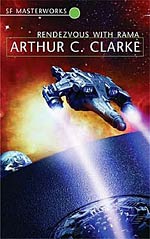
![]() DrPerschon
DrPerschon
12/30/2014
![]()
When I've taught Science Fiction, it's rare that I get English majors in the room. My students have tended to be either fine arts or engineering and sciences students. On the one side, creative types, on the other, pragmatists. Consequently, they aren't terribly nonplussed by writers like Arthur C. Clarke, who is more interested in an idea than the people who have ideas. Recently, I heard an English major declaim that science fiction and fantasy weren't worth his time--the writing simply wasn't good enough.
English students are trained to read for character and theme, to look for buried metaphors and easter eggs between the lines. If they take a course in Literary Theory, they can read things into a text that aren't even there. A book like Rendezvous with Rama doesn't respond well to those sorts of readings. It needs fine arts students, engineers, and scientists to read it.
The characters all sound alike, their dialogue interchangeable. There is a sense of who these people are, but that isn't the point. Unlike the film Gravity, which is about a character and not about the science of space exploration, Clarke's Rama isn't about character: it's about the science of space exploration.
The book is like a mystery novel, where the corpse is a ten trillion ton interstellar spacecraft, but where we never really find out "whodunnit." The journey is not about answers, but about big questions. If ever there were a science fiction novel that fits the bill of being "speculative" literature, Rama is it. And it asks more questions than it answers, speculates more than it concludes.
There are moments of tension and plot-related adventures which keep the reader turning pages, but the real reason we read on is to discover the nature of this giant spacecraft, to understand where it came from and what its purpose is. In this first of the Rama books, we don't find out. And comfortable with that mystery, I doubt I'll ever get around to reading the sequels. Because sometimes, even hard SF is about the question that drives us, not the answer that might disappoint.
http://www.steampunkscholar.com